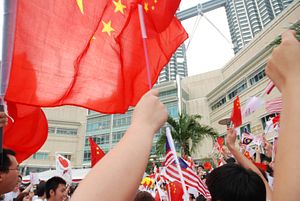China’s outreach to ASEAN member states continues. In addition to visits by President Xi Jinping to Vietnam, Singapore, and now the Philippines, Premier Li Keqiang is preparing to head to Malaysia. Li will be attending the various ASEAN-related meetings, including the East Asia Summit, in Kuala Lumpur, in addition to having his first official visit to Malaysia.
Before Li arrived, however, Xi held his own bilateral meeting with Malaysian Prime Minister Najib Razak in Manila, where both leaders will be attending the Asia-Pacific Economic Cooperation (APEC) summit. Xi assured Najib that China considers boosting relations with Malaysia to be a priority in its neighborhood diplomacy, playing into the narrative that the two countries have a ‘special relationship.’
“China and Malaysia are good neighbors and friends that trust and respect each other,” Xi told Najib. Xi also pledged increased investment in Malaysia, and pointed to the development of the 21st Century Maritime Silk Road as an opportunity to advance relations between the two sides.
Najib, for his part, told reporters that he and Xi had agreed “the state of bilateral relations is at its best based on mutual trust and friendly cooperation between the two countries as close partners.”
Still, the friendly rhetoric hides concerns in Malaysia over China’s assertive moves to advance its claims in the South China Sea – including claims to Luconia Shoal, which Malaysia considers part of its exclusive economic zone. As Prashanth Parameswaran has noted for The Diplomat, Malaysia has recently become more vocal about reacting to incursions by Chinese Coast Guard vessels.
Over the weekend, Malaysian Deputy Prime Minister Zahid Hamidi spoke out against China’s claims and construction in the South China Sea (though he avoided mentioning China by name). “We have a country that is building 3 km-long airstrips and port facilities, supposedly for its coast guard,” Zahid said. “Does this make sense when that country’s mainland is more than 3,000 km away?”
Zahid also emphasized Malaysia’s claim to a 200 nautical mile exclusive economic zone, and said that “Malaysians should rise to defend our country” should it be “threatened or encroached” upon.
Zahid’s rhetoric is the exception rather than the rule, however. Kuala Lumpur is generally more low-key in its response than other claimants, such as Vietnam and the Philippines, choosing instead to raise its concerns in private bilateral discussions (China’s preferred method of dealing with the disputes). Malaysia clearly values its ‘special relationship’ with China, which is also its top trading partner, too much to risk disrupting ties with vocal opposition on the South China Sea issue. That means China’s current bout of ASEAN diplomacy has its best chance of succeeding in Malaysia.
That fact isn’t lost on China, which wants to use Li’s visit to Malaysia and attendance at the ASEAN meetings as a way to reboot China-ASEAN ties. In a press briefing on Li’s trip, Vice Foreign Ministry Liu Zhenmin said that China-ASEAN relations are at a “new starting point” with “new opportunities.” In particular, China hopes that, against the backdrop of the new ASEAN Economic Community coming later this year, it can use economic and trade relations to smooth over tensions in other areas.
“Closer trade and economic ties among East Asian countries will help the region cope with challenges and promote the stable and sound development of the world economy,” Vice Commerce Minister Gao Yan said, speaking at the same press conference.
To that end, Beijing wants to shift the focus away from maritime disputes and back to its plan for a Maritime Silk Road linking the China, the Southeast Asian states, and part beyond – as far away as Europe, if the plan reaches fruition. Under the aegis of the Maritime Silk Road, China is willing to offer the region help in building up critical infrastructure needs, including providing funds via the new Asian Infrastructure Investment Bank. But the plan lost some momentum as potential partners began to rethink their willingness to allow China to invest in maritime infrastructure, given its actions in the South China Sea disputes.
Gao said Li’s visit to Malaysia will promote cooperation on the Maritime Silk Road, including infrastructure construction, as well as generally boosting bilateral trade and investment. Gao also said China would seek in particular to pursue cooperation on high-speed rail projects with Malaysia. Beijing already has deals to construct high-speed rail lines in Laos and Indonesia, as well as a major rail line in Thailand.
During Li’s visit, China will also emphasize the need to finalize negotiations on the Regional Comprehensive Economic Partnership (RCEP), a free trade area that will include the 10 ASEAN members as well as Australia, China, India, Japan, South Korea, and New Zealand. Finalization of RCEP would be a much-needed positive piece of news for China’s neighborhood diplomacy – and would help offset any negative economic effects from the recently-concluded Trans-Pacific Partnership trade agreement, which notably does not include China.

































